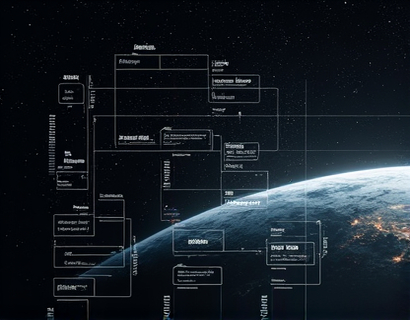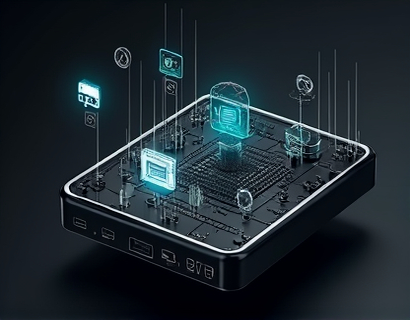Maximizing Engagement and Growth: Harnessing the Power of Crypto and AI for Digital Transformation
The intersection of cryptocurrency and artificial intelligence (AI) represents a transformative frontier in the tech industry, offering unprecedented opportunities for businesses and tech enthusiasts to innovate and grow. This article delves into the strategic insights required to leverage the synergy between blockchain technology and AI, focusing on how these combined forces can maximize digital engagement and drive sustainable growth. By understanding the fundamental principles and practical applications of BlockchainAI, stakeholders can position themselves at the forefront of the digital revolution.
Understanding Blockchain and AI
To effectively harness the power of BlockchainAI, it is essential to grasp the core concepts of both blockchain technology and AI. Blockchain, at its core, is a decentralized ledger that records transactions across multiple computers in a way that ensures security, transparency, and immutability. This technology underpins cryptocurrencies like Bitcoin and Ethereum, but its applications extend far beyond digital currencies to include supply chain management, identity verification, and smart contracts.
Artificial intelligence, on the other hand, encompasses a range of technologies that enable machines to perform tasks that traditionally required human intelligence, such as learning, reasoning, and problem-solving. AI algorithms can process vast amounts of data, identify patterns, and make predictions, making them invaluable in areas like customer service, marketing, and operational efficiency.
The convergence of blockchain and AI, often referred to as BlockchainAI, creates a powerful synergy. Blockchain provides a secure and transparent framework for data integrity, while AI enhances the processing and analysis of data, leading to more informed decision-making and innovative solutions.
Enhancing Data Security and Integrity
One of the primary benefits of integrating blockchain and AI is the significant improvement in data security and integrity. Blockchain's decentralized and immutable nature ensures that data cannot be altered or tampered with once it is recorded. This is particularly crucial in industries where data integrity is paramount, such as finance, healthcare, and supply chain management.
AI can further enhance this by analyzing blockchain data to detect anomalies and potential security threats in real-time. Machine learning algorithms can be trained to identify patterns that indicate fraudulent activity or data breaches, allowing for proactive measures to be taken. This combination not only safeguards sensitive information but also builds trust among users and stakeholders, fostering greater adoption and engagement.
Optimizing Operational Efficiency
BlockchainAI can revolutionize operational efficiency by automating and streamlining processes. Smart contracts, self-executing contracts with the terms directly written into code, can automate transactions and agreements without the need for intermediaries. This reduces costs, speeds up processes, and minimizes the risk of human error.
AI can optimize these smart contracts by analyzing historical data and predicting outcomes, enabling more precise and efficient contract design. For instance, in supply chain management, AI can predict demand and optimize inventory levels, while blockchain ensures transparent and traceable transactions. This dual approach not only enhances efficiency but also provides a comprehensive view of the entire supply chain, allowing for better decision-making.
Personalized User Experiences
In the digital age, personalized experiences are key to engaging users and driving growth. AI-driven analytics can process vast amounts of user data to create detailed profiles, enabling businesses to tailor their offerings to individual preferences and behaviors. When combined with blockchain, this personalization can be achieved securely and transparently.
Blockchain can ensure that user data is owned and controlled by the individuals, with consent-based data sharing mechanisms. AI can then use this data to deliver personalized content, recommendations, and services. This not only enhances user satisfaction but also builds a loyal customer base, as users feel more in control of their digital footprint.
Innovative Business Models
The integration of blockchain and AI opens up new business models that were previously unimaginable. For example, tokenization, the process of converting assets into tokens on a blockchain, can be combined with AI to create dynamic and adaptive pricing models. This allows for more flexible and fair pricing strategies, benefiting both businesses and consumers.
In the realm of digital content, blockchain can ensure the authenticity and ownership of creative works, while AI can analyze audience preferences to optimize content distribution. This synergy can lead to new revenue streams through decentralized platforms where creators are directly compensated based on AI-driven demand predictions.
Fostering Trust and Transparency
Trust is a critical factor in any business interaction, and the combination of blockchain and AI can significantly enhance transparency. Blockchain's transparent ledger allows all parties to verify transactions and data, reducing the need for intermediaries and building trust through verifiable evidence. AI can further augment this by providing real-time insights and audits, ensuring that all processes are fair and above board.
In industries like voting systems and identity verification, this level of transparency and trust is invaluable. Blockchain ensures that votes or identity data cannot be altered, while AI can monitor and analyze the system to detect any irregularities, ensuring a fair and trustworthy process.
Challenges and Considerations
While the potential benefits of BlockchainAI are substantial, there are also challenges and considerations that must be addressed. One of the primary challenges is the technical complexity involved in integrating these technologies. Businesses need to invest in skilled personnel and robust infrastructure to implement and maintain these systems effectively.
Another consideration is the regulatory landscape. As blockchain and AI are relatively new fields, regulations are still evolving. Companies must stay informed about legal requirements and ensure compliance to avoid potential pitfalls. Additionally, there is a need for standardization to facilitate broader adoption and interoperability.
Strategic Implementation
To successfully harness the power of BlockchainAI, businesses should adopt a strategic approach. Here are some key steps to consider:
- Assess Current Infrastructure: Evaluate existing systems and identify areas where blockchain and AI can add value.
- Define Objectives: Clearly define the goals and benefits you aim to achieve through BlockchainAI integration.
- Build a Skilled Team: Assemble a team with expertise in both blockchain and AI to lead the implementation process.
- Pilot Projects: Start with small-scale pilot projects to test and refine the integration before a full-scale rollout.
- Monitor and Adapt: Continuously monitor the performance of the BlockchainAI system and be prepared to make adjustments based on real-world feedback and data.
Conclusion
The convergence of blockchain and AI represents a significant leap forward in digital transformation, offering businesses and tech enthusiasts a powerful toolkit to enhance engagement, security, and growth. By understanding and strategically implementing BlockchainAI, stakeholders can navigate the evolving tech landscape with confidence and innovation. As the digital world continues to evolve, those who embrace this synergy will be well-positioned to lead the way.










































